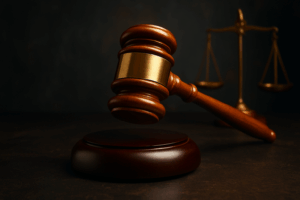Indigenous elders from the Torres Strait Islands faced a setback as the Australian government prevailed in a significant climate change case. Community leaders Uncle Pabai Pabai and Uncle Paul Kabai had challenged the government for failing to protect their islands from climate impacts but saw their claims rejected by the Federal Court, which stated that climate policy falls within parliamentary jurisdiction. The ruling casts a shadow over the cultural and physical future of the Torres Strait, home to a predominantly Indigenous population facing rising sea levels and environmental degradation.
Indigenous Elders' Climate Battle Dismissed by Australian Courts

Indigenous Elders' Climate Battle Dismissed by Australian Courts
A landmark judgment dismisses Indigenous elders' climate case against the Australian government, raising concerns over climate action.
The Torres Strait Islands, located between far-north Queensland and Papua New Guinea, are grappling with the devastating effects of climate change. Elders Pabai Pabai and Paul Kabai initiated legal proceedings against the Australian government in 2021, arguing that it had failed in its duty to protect their traditional lands from climate threats. Their case was dismissed by the Federal Court judge, who determined that matters of climate policy should be resolved through political means and not the judiciary.
Approximately 4,000 people inhabit the Torres Strait Islands, 90% of whom identify as Indigenous. The islands, rich in cultural heritage and unique customs, are experiencing alarming environmental changes. The Federal Court recognized the rising sea levels in the region, which have increased at a rate of 6 cm per decade, notably higher than the global average. The elders claimed that the inaction of the government on climate change would result in cultural loss and displacement of their community.
Justice Michael Wigney acknowledged the adverse impacts of climate change but ruled that existing Australian negligence laws do not permit compensation for cultural or customary losses caused by government policies. He observed that while climate change poses a severe threat, addressing emission targets is typically a political issue. Despite this, Justice Wigney stressed the urgent need for action on climate change to safeguard the future of the islands and their residents.
Elder Pabai expressed the emotional toll of the decision, sharing, "My heart is broken for my family and my community." Similarly, Uncle Paul cited his deep emotional connection to the land and the profound implications of losing it. He reminisced about the bountiful resources of his childhood in Saibai, lamenting how climate change has drastically altered the landscape and diminished its natural wealth.
In response to dwindling resources and extreme weather events, the Australian government has recently reinstated more ambitious climate targets. Climate Minister Chris Bowen and Indigenous Minister Malarndirri McCarthy acknowledged the vulnerabilities of the Torres Strait Islands while emphasizing their commitment to addressing climate issues.
Despite this setback, some experts suggest that the outcome could bring about legal reforms regarding climate accountability and encourage the government to accelerate its climate action initiatives. Riona Moodley, from the University of NSW, indicated that Australian law needs to evolve to effectively address the challenges posed by climate change.
As the community continues to struggle with the existential threat posed by climate change, the need for comprehensive and immediate action has never been clearer.
Approximately 4,000 people inhabit the Torres Strait Islands, 90% of whom identify as Indigenous. The islands, rich in cultural heritage and unique customs, are experiencing alarming environmental changes. The Federal Court recognized the rising sea levels in the region, which have increased at a rate of 6 cm per decade, notably higher than the global average. The elders claimed that the inaction of the government on climate change would result in cultural loss and displacement of their community.
Justice Michael Wigney acknowledged the adverse impacts of climate change but ruled that existing Australian negligence laws do not permit compensation for cultural or customary losses caused by government policies. He observed that while climate change poses a severe threat, addressing emission targets is typically a political issue. Despite this, Justice Wigney stressed the urgent need for action on climate change to safeguard the future of the islands and their residents.
Elder Pabai expressed the emotional toll of the decision, sharing, "My heart is broken for my family and my community." Similarly, Uncle Paul cited his deep emotional connection to the land and the profound implications of losing it. He reminisced about the bountiful resources of his childhood in Saibai, lamenting how climate change has drastically altered the landscape and diminished its natural wealth.
In response to dwindling resources and extreme weather events, the Australian government has recently reinstated more ambitious climate targets. Climate Minister Chris Bowen and Indigenous Minister Malarndirri McCarthy acknowledged the vulnerabilities of the Torres Strait Islands while emphasizing their commitment to addressing climate issues.
Despite this setback, some experts suggest that the outcome could bring about legal reforms regarding climate accountability and encourage the government to accelerate its climate action initiatives. Riona Moodley, from the University of NSW, indicated that Australian law needs to evolve to effectively address the challenges posed by climate change.
As the community continues to struggle with the existential threat posed by climate change, the need for comprehensive and immediate action has never been clearer.





















